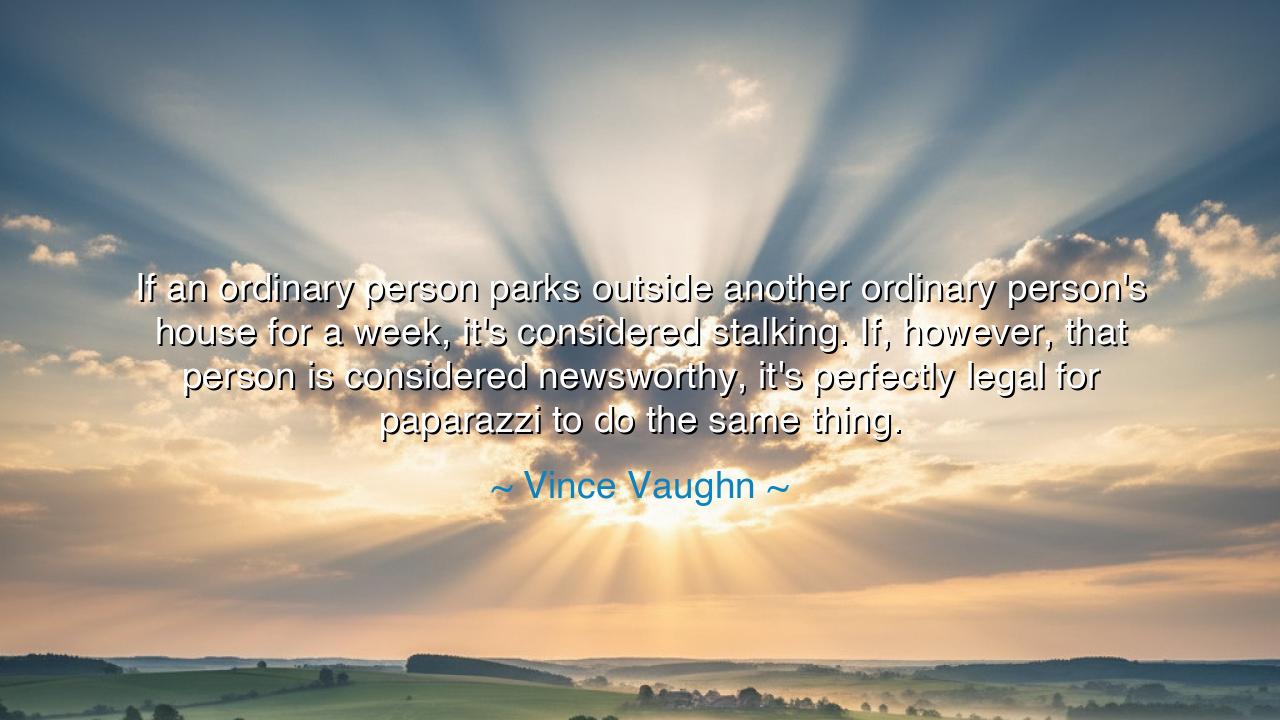
If an ordinary person parks outside another ordinary person's
If an ordinary person parks outside another ordinary person's house for a week, it's considered stalking. If, however, that person is considered newsworthy, it's perfectly legal for paparazzi to do the same thing.






There are truths that only the age of spectacle can reveal, and Vince Vaughn spoke one with quiet fury when he said: “If an ordinary person parks outside another ordinary person's house for a week, it's considered stalking. If, however, that person is considered newsworthy, it's perfectly legal for paparazzi to do the same thing.” Beneath this observation lies a mirror reflecting our age’s great hypocrisy — that fame, once a blessing sought by poets and kings, has become a cage built by society’s obsession with visibility. Vaughn’s words are a lament for privacy, for dignity, and for the quiet spaces of the human soul that the world, in its hunger for entertainment, has learned to invade without shame.
The origin of this quote rests not merely in Hollywood, but in the broader sickness of modern culture — a culture that confuses access with intimacy and curiosity with entitlement. Vaughn, himself both celebrated and hunted by the flashing eyes of the camera, speaks from the experience of being both adored and pursued. His point is simple yet profound: the law, which claims to defend the rights of all, bends its spine before celebrity. What is considered harassment for one man becomes “journalism” for another; what would earn arrest in the shadows of the city earns applause in the light of a red carpet. Thus, he exposes a wound at the heart of justice — the double standard that elevates gossip to the level of law.
In the ancient world, the boundaries between public and private life were guarded as sacred. Marcus Aurelius, the philosopher-emperor, wrote of the necessity for solitude, for time to reflect and commune with one’s own thoughts. He understood that without the refuge of privacy, a person loses the ability to hear the voice within. But in our modern age, Vaughn warns, that refuge is under siege. The paparazzi, those soldiers of the spectacle, wage a relentless campaign against stillness. They turn human lives into commodities, trading intimacy for profit. What is legal, he reminds us, is not always moral. The law may tolerate their cameras, but the soul recoils from their cruelty.
There is a deep irony here, for the very society that worships celebrity also destroys it. It crowns its idols with glory, then feeds on their exhaustion. The tragic death of Princess Diana remains one of history’s clearest examples. Pursued by photographers as she fled through the Paris night, she became the ultimate offering to the altar of public curiosity. Her death, like a mirror shattered in light, showed the world what it had become — a civilization that mistook intrusion for admiration, and spectacle for love. Vaughn’s words, though spoken decades later, carry the echo of that loss: the reminder that when the crowd forgets compassion, its applause becomes violence.
Yet Vaughn does not merely condemn; he instructs. His reflection calls us to question the morality of the lens, to ask not what we are allowed to see, but what we deserve to see. A free press is the shield of democracy, yes — but freedom without restraint becomes tyranny of another kind. When fame strips a person of their right to be human, when we defend cruelty by calling it “public interest,” we are no longer free; we are voyeurs disguised as citizens. The great wisdom of this quote is not about celebrities alone, but about the soul of a society that cannot distinguish between information and intrusion.
In every era, there have been watchers — spies, chroniclers, poets — but the ancients knew to keep reverence for what was unseen. In Greek tragedy, those who gazed upon sacred mysteries without permission were struck down by fate, for there are parts of life that must remain hidden to preserve their holiness. Vaughn’s words call us back to that ancient understanding. The human heart, whether famous or forgotten, has a right to its silence, its sorrow, its imperfection unobserved. To trespass upon it for profit is to desecrate something divine.
Let this teaching endure, then, for those who live in the age of endless exposure: honor the unseen. Do not measure worth by how visible a person becomes, nor mistake fame for permission. The boundaries of respect must not shift with the brightness of the spotlight. For if privacy dies for the famous today, it will die for all tomorrow. Guard your empathy as you would your freedom, for they are one and the same. And when next you see a camera chasing someone’s peace, remember Vaughn’s warning: that legality does not sanctify cruelty, and that the truest form of civilization is not in how much we know about others — but in how much we allow them to keep for themselves.






AAdministratorAdministrator
Welcome, honored guests. Please leave a comment, we will respond soon